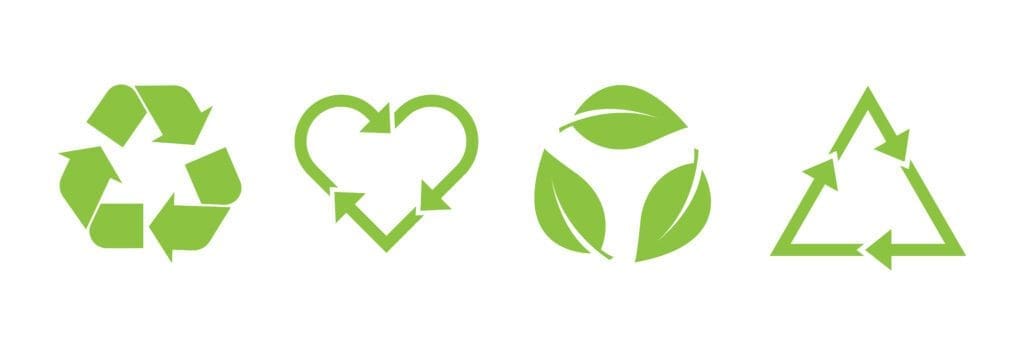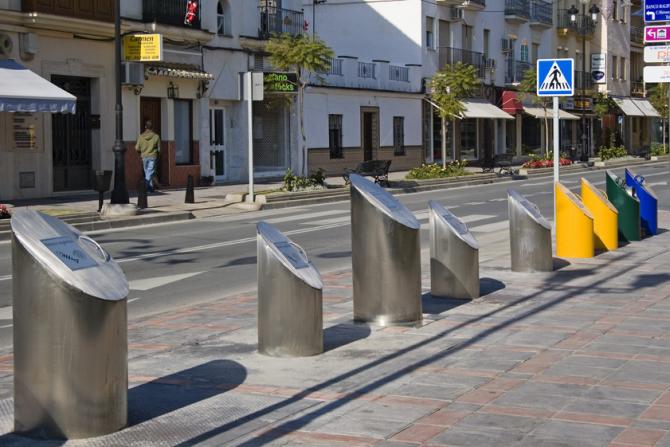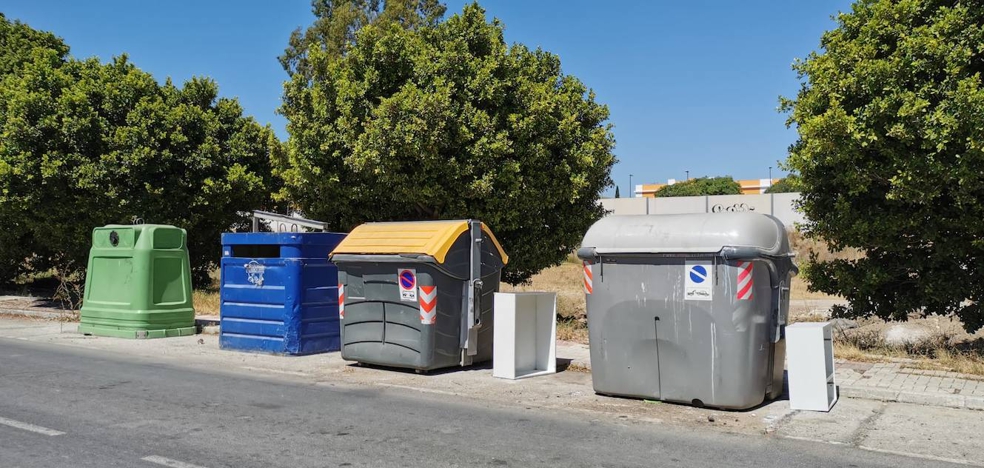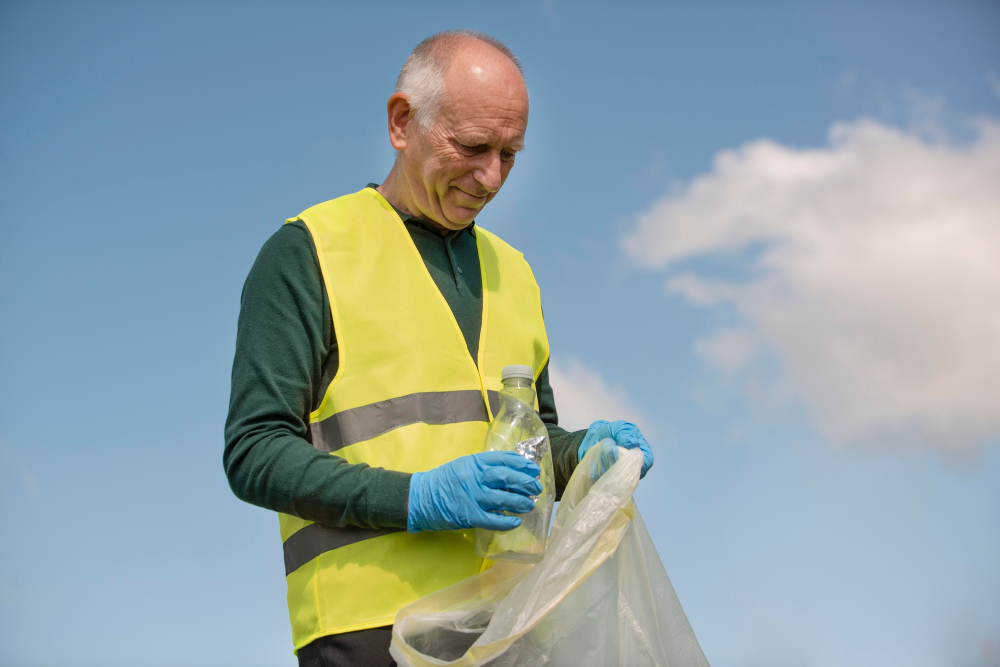Recycling in Spain: A Snapshot
While Spain has been lagging behind the recycling guidelines set by the European Union for 2020, the country has a straightforward recycling system that residents and visitors alike have begun to embrace over the past few years. Encouragingly, companies are manufacturing products made from recycled materials, creating a loop of sustainable consumption and production.
The Spanish recycling system utilizes color-coded bins for different materials:
- Green Bins
- Blue Bins
- Yellow Bins


The Greater Picture: Significance of Recycling
Recycling is not just about conserving resources and reducing landfill waste; it is an integral part of sustainable development. It’s about creating a system where we can continually reuse resources, minimizing our reliance on virgin materials, and thus reducing our environmental footprint. This is where the concept of a ‘circular economy’ comes into play. The circular economy model seeks to keep resources in use for as long as possible, extracting the maximum value from them while in use, and then recovering and regenerating products and materials at the end of their service life.
The Environmental Ripple Effect
The environmental benefits of recycling are manifold. Recycling reduces the demand for raw materials and decreases energy consumption and carbon emissions associated with mining and manufacturing processes. Furthermore, recycling helps preserve biodiversity by reducing the need for raw material extraction which often leads to habitat destruction and species displacement.
Challenges and Opportunities in Recycling
Despite its benefits, recycling faces numerous challenges. Contamination of recyclables, lack of consumer awareness, and inconsistencies in recycling programs across different regions are some of the issues that need to be addressed. However, technological advancements are making it possible to recycle more types of materials and improve the efficiency of recycling processes.


Actionable Steps for Individuals
While it’s essential to understand the broader context of recycling, it’s equally important to know what you can do on a personal level to contribute. Here are some actionable steps:
- Educate Yourself: Learn about the recycling policies and practices in your area. Understand what materials are recyclable and how to properly prepare items for recycling.
- Reduce and Reuse: Before recycling, think about how you can reduce your consumption and reuse items. This might involve buying products with less packaging, using reusable shopping bags, or repurposing items instead of throwing them away.
- Buy Recycled Products: Support the recycling industry by purchasing products made from recycled materials. This encourages companies to incorporate more recycled content into their products.
- Spread the Word: Share your knowledge with others. Encourage your friends, family, and community members to recycle and make sustainable choices.
A Comprehensive Guide to Recycling in Spain
The Recycling System
The recycling system in Spain employs color-coded bins for different materials, which are picked up and emptied every night or early morning. These bins are typically found in city squares or main streets and are quickly filled up in residential areas.
Green Bins
Green bins, one of the two large bins typically found in cities around Spain, are designated for glass items. This includes bottles of olive oil, wine, beer, cider, vinegar, and glass jars of various food products like spaghetti sauce, salad dressing, and more. Cosmetics and perfume bottles can also be deposited in these bins once they’re empty.
It’s crucial to note that caps or corks for bottles and lids for jars do not go into this bin but are instead recycled in different colored bins. The recycled glass from these bins is used to make new bottles, containers, and even light bulbs.
Blue Bins
The blue bins in Spain are solely for recycling paper and cardboard. This encompasses magazines, newspapers, large sheets of paper, receipts, unsoiled to-go boxes, moving boxes, cardboard packages, large mailing envelopes, and even boxes from packaged foods like cereal, rice, pasta, and other dry goods.
However, empty containers of boxed UHT milk, soup, or pre-made broth, often referred to as “briks,” do not go into these bins but belong in a different one. The recycled materials from these bins are used to create new cardboard boxes, paper, toilet paper, and dumpster bags for construction sites.
Yellow Bins
The yellow bins are for all different types of plastic. This includes plastic containers of all sizes, such as those for yogurt, butter, cleaning products, and soda bottles, as well as plastic bags. Metal cans, including those for canned drinks, tuna, and other fish tins, are also deposited in this bin. Even certain odd-looking items like boxed milk and soup, styrofoam, aluminum foil, and plastic wrap go into the yellow bins.
The plastic and other materials from these bins are collected by the city and sent to a recycling center, where workers separate, compact, and distribute the plastic for other purposes. Even products like trash cans and beauty products are now being made using the recycled plastic from these bins.
Understanding the Two Types of Recyclable Waste Containers in Málaga
There are two types of containers used for recyclable waste. The first type consists of metallic bins that are embedded underground. The second type is the large above-ground containers that are commonly seen on most streets.




The Importance of Cleaning Recyclables
Before you toss that plastic bottle or tin can into the recycling bin, stop and consider one important step – cleaning. It may seem like a small detail, but ensuring your recyclables are clean is a crucial part of the recycling process.
Here’s why it matters: Residual food or liquid waste can contaminate other items in the recycling bin, potentially rendering them non-recyclable. This could significantly impact the efficiency of recycling plants, leading to higher costs and lower rates of recycling.
For instance, you should rinse out plastic and glass bottles to remove any food or beverage residue. Aluminum cans should also be rinsed, and if possible, crushed to save space. For cardboard packaging such as cereal or pasta boxes, make sure they are free from food scraps.
The norms of recycling can vary depending on the location, so it’s always a good idea to check with your local recycling directives. In the case of Spain, although the regulations might differ from one region to another, cleaning your recyclables is generally recommended.
Remember, every little step counts in our shared mission to protect our planet. So, the next time you’re about to throw something in the recycling bin, take a moment to ensure it’s clean. Your efforts can make a big difference in the grand scheme of things.
Andalucia Limpia: Keeping Malaga and Beyond Clean
Andalucia Limpia is a public service company that plays a vital role in the environmental health of Malaga and the surrounding areas. By 2025, they aim to be recognized on both a regional and national level as a leading company in the efficient and integrated management of public cleaning services and their contribution to environmental care.
Their mission is to provide quality, timely, and efficient cleaning services using the required technology and infrastructure. They pride themselves on having a well-trained and capable human team dedicated to the comprehensive management of solid waste to meet their clients’ needs, benefit the community, and care for the environment.
Andalucia Limpia’s services are extensive and cater to the needs of residential, commercial, and industrial sectors. They collect waste from these sectors as part of their public cleaning services. The organization also provides public street sweeping services in various sectors of the municipality of Andalucia. In addition, they are responsible for maintaining green public areas by offering services such as pruning and grass cutting.
Their Social Media: https://www.instagram.com/andalimpia
Vamos Academy: A Green Spanish School in Malaga:
Located in the heart of sunny Malaga, Vamos Academy is more than just a place to learn Spanish. This Spanish school stands as a beacon of sustainability within the education sector, not just offering immersive Spanish classes in Malaga but also actively molding conscientious global citizens.
The Academy’s innovative measures begin within their classrooms. In a bid to reduce waste, Vamos Academy has transitioned to a paperless system, prioritizing digital resources. Spanish classes in Malaga, at this eco-conscious institution, encourage students to utilize electronic devices for note-taking and assignments, dramatically diminishing paper consumption.
Harnessing the power of Spain’s abundant sunlight, Vamos Academy has integrated solar panels into its infrastructure. This renewable energy source powers everything from the lights illuminating the classrooms where Spanish classes in Malaga occur to the computers that students use.
Significantly, Vamos Academy has woven environmental education into its curriculum. As students delve into Spanish classes in Malaga, they also learn about crucial environmental issues, understanding the importance of sustainable living. The school’s comprehensive recycling program and community garden serve as practical applications of this education, allowing students to put their learning into action.
Vamos Academy proves that Spanish classes in Malaga can be more than just language learning; they can be a platform for fostering a greener tomorrow.
Despite Spain’s current standing in terms of EU recycling guidelines, the country’s easy-to-learn recycling system and its increasing adoption by the populace are encouraging signs. With continued efforts in recycling and sustainable manufacturing, Spain, along with the rest of the world, can make significant strides towards a more sustainable future.






